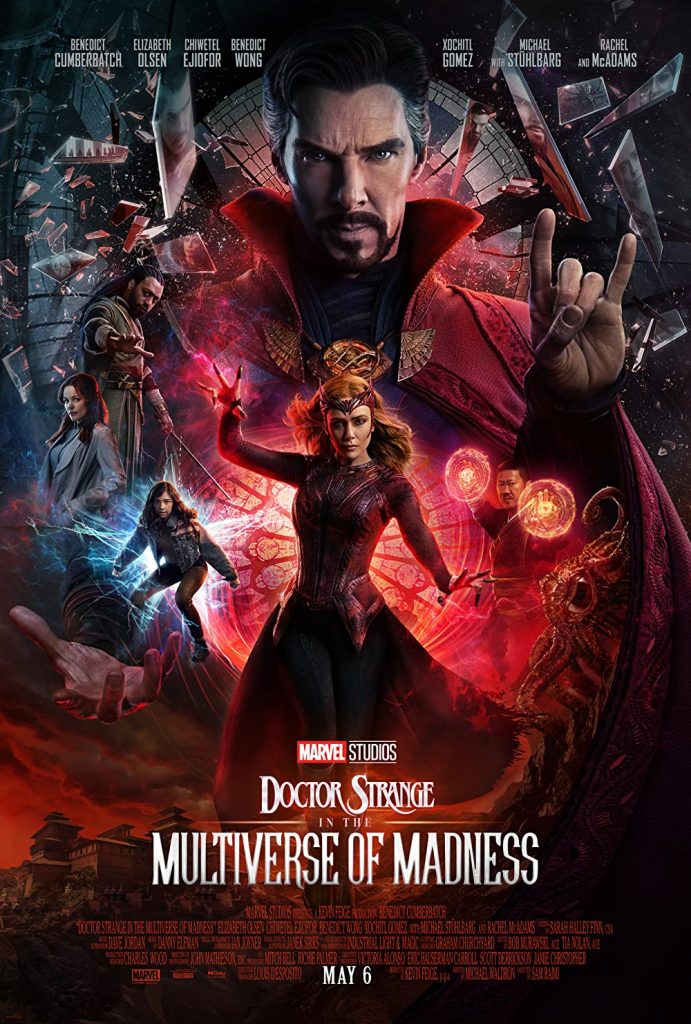Stranger and Stranger: Doctor Strange in the Multiverse of Madness
 by Ted Giese
by Ted Giese
Sam Raimi’s Doctor Strange in the Multiverse of Madness is the follow-up to Scott Derrickson’s 2016 film, Doctor Strange, which introduced neurosurgeon Dr. Stephen Strange into the Marvel Cinematic Universe.
A lot has happened to the character between the first film and this one. He helped defeat intergalactic villain Thanos in Avengers: Infinity War and Endgame. He became foolishly entangled in Spider-Man’s multiversal-web in Spider-Man: No Way Home. In Doctor Strange in the Multiverse of Madness, Strange and fellow sorcerer, Wong, team up to protect a teenage girl with the power to traverse the multiverse: America Chavez, who is on the run from an unknown evil seeking to steal her powers.
We quickly learn that the villain in question is the Scarlet Witch—an evil alternate identity of the Avenger, Wanda Maximoff. She is still grief stricken over the loss of her partner, the Vision, and apparently psychologically broken by the events of WandaVision—a miniseries in which Maximoff conjured up a ‘bubble universe,’ in which she and Vision lived happily ever along with two preconscious young boys.
Offscreen, Maximoff has been studying the evil magical grimoire called The Darkhold, leading her dissociated self—the Scarlet Witch—to emerge. In this film, she uses magical dream-walking to seek a universe in the multiverse where her imaginary boys are real and she can be their mother—even if it means murdering a multiverse version of herself. The Scarlet Witch believes absorbing Chavez’ power is the key to make her fantasy a reality.
Are all these details important to keep straight? Not really! Doctor Strange in the Multiverse of Madness is like a big swath of cotton candy; the moment it rains, it all dissolves. This is the kind of disposable film that rewards low expectations; the more it is contemplated the less impressive it becomes. For some, it may be exciting in the moment but will likely fade away quickly. The film feels like a place holder and lacks a cohesive story of its own. The Multiverse of Madness seems more interested in hinting where Disney is going next with the MCU than in telling the continuing story of Doctor Stephen Strange.
Intending to appeal to what a stereotypical young person might want to see, the multiverse traveling Latina character is a teenage girl with a pride flag badge on her faded American-flag-inspired denim jean jacket, complete with the phrase “amor es amor” Spanish for “love is love,” and Mexican Day of the Dead sugar skull detailing.
Who is America Chavez? Intending to appeal to what a stereotypical young person might want to see, the multiverse traveling Latina character is a teenage girl with a pride flag badge on her faded American-flag-inspired denim jean jacket, complete with the phrase “amor es amor” Spanish for “love is love,” and Mexican Day of the Dead sugar skull detailing. She’s also a bit of a socialist espousing disparaging ideas about having to pay for food (which apparently isn’t the case in most other universes she’s visited). Readers of the comic books which introduced her in 2011 will know she is a lesbian, and her mothers are lesbians. In the film, they were accidentally sucked into a portal when Chavez first discovers she has the power to open portals between universes. At first the power only activates when she is frightened, but by the end of the film she is given the generic bland advice to “Trust yourself, trust your power,” which unlocks the greatness that was there all along. It’s all very boring.
Chavez is a walking MacGuffin, a plot device to drive the story. Here she functions as the MacGuffin that the Scarlet Witch is trying to catch and use, while at the same time she is the MacGuffin that Doctor Stephen Strange is trying to protect and keep from danger. As the MacGuffin, Chavez is also the key to everything; hence everyone is interested in her.
She also serves as a piece of virtue signaling from Disney within the MCU; her character embodies many of the things that secular and leftist North American society values. She’s not male, not conservative, not ethnically or racially ‘white,’ not from a patriarchal family, and not ‘cisgender’ in her sexuality. Disney has doubled down on highlighting this kind of representation in its films, parks, publishing, and streaming service. For many, it will come across as pandering, even as others think it doesn’t go far enough. All of this leads to one of the most unintentionally amusing lines in the film when one character asks: “Is America okay?” This may be a sort of litmus test for viewers if they hear the question as a non-sequitur about the state of the United States of America. Also, having Chavez’s first name be America leads to people saying things like “we have to save America,” which just sounds odd.
Chavez also operates as an audience surrogate. But mileage will vary on this third aspect of Chavez’s character, since the character is so perfectly tailored to fit a particular ideological profile.
There are two other two MacGuffins—both books—in the film. The first is an evil one called The Darkhold. The other is a good magical book called The Book of Vishanti. This fabled second book is supposed to give readers exactly what they need to solve their problem whatever it might be. In this case Strange hopes to use the book to stop The Scarlet Witch from capturing America Chavez and potentially wreaking havoc across the multiverse. A good chunk of the film revolves around obtaining The Book of Vishanti only to have it turn out to be a red herring. Doctor Strange can’t use the book and in the end must fight fire with fire, using a multiverse copy of The Darkhold to use the same sorts of dark arts magic used by The Scarlet Witch in an attempt to defeat her before it’s too late.
Sam Raimi, who famously directed the horror films The Evil Dead and its sequels as well as the original Spider-Man trilogy from the early 2000’s, would seem a good fit to make the over the top and often slapstick Multiverse of Madness. But whatever Raimi’s vision was for this film, it seems to have been lost in translation. There could be an interesting story here—somewhere—but it’s so convoluted with fan service and multiverse winks and nods that it’s almost obscured beyond view. Doctor Strange isn’t even the hero of his own movie. He only helps support Chavez who sets up a scenario in which the Scarlet Witch defeats herself.
The absurd nature of the Multiverse of Madness invites viewers to honestly wrestle with the reality of the world in which they live. And perhaps in that way some good will come of it.
In fact, each of the three central characters are essentially fighting themselves. Doctor Strange fights an evil three-eyed multiverse version of himself using musical notes. Chavez needs to learn how to believe in herself in order to conquer her fears and poor self-esteem. And the Scarlet Witch is only defeated when shown the error of her ways by a multiverse Wanda Maximoff.
Ultimately, the film has no heart and soul. The one thing that might have provided that emotional grounding would have been a scene between Vision and Wanda. He is mentioned in passing but strangely the Scarlet Witch is more focused on finding a way to be with her imaginary children than on the original source of her grief: the death of her soul mate.
Is there anything here from which a Christian viewer can glean any insight? Doctor Strange’s choice to fight fire with fire regarding shows a kind of hubris Christians should avoid. He uses The Darkhold’s occult magic, believing that, while Wanda and even other versions of himself had been harmed by using it, he would somehow not. He is mistaken, and proves that the use of this occult magic “exacts a heavy toll” from those who use it. Scripture forbids Christians from involving themselves in the occult (Exodus 22:18 Galatians 5:19-21 Revelation 21:8). The Acts of the Apostles even gives an account of people giving up their sorcery to become Christians and burning their occult books (Acts 19:19). And Scripture specifically forbids a Christian’s involvement in necromancy (Leviticus 19:31 and 20:6; 2 Kings 23:24), a practice which Doctor Strange engages in while manipulating a zombie version of one of his multiverse selves—a far cry from the Christian idea of the resurrection of the dead!
Multiverse of Madness also continues the move in the MCU to slip metaphysics in the back door—be it the focus on occult books and magic, sorcerers and witches, or demons and gods. The Thor films of course introduced the Norse pantheon, and the recent Disney+ series Moon Knight has brought in the Egyptian gods as well. We’re a long way out from the concrete materialism 2008’s Iron Man. Now the MCU is dealing with questions of life and death, discussing abstract concepts like identity, time, space, and what it means to be and to know. On the one hand this is a good thing, because it keeps conversation about these things alive in the public square. On the other hand, the direction this film takes follows a dark path forbidden to Christians.
 Regardless of their personal beliefs, viewers will need to measure what they know and confess to be true against what they watch—even in a film as silly and shallow as Doctor Strange in the Multiverse of Madness. Consider the idea in the film that “Dreams are windows into other multiverse universes,” and that therefore what a person dreams is true somewhere in some other universe for a different version of themselves. This means that whatever is up in one universe might be down in the next, and with a multiplicity of universes what is good in one place may be evil in another. The film is thus underpinned by the moral relativism of postmodernism.
Regardless of their personal beliefs, viewers will need to measure what they know and confess to be true against what they watch—even in a film as silly and shallow as Doctor Strange in the Multiverse of Madness. Consider the idea in the film that “Dreams are windows into other multiverse universes,” and that therefore what a person dreams is true somewhere in some other universe for a different version of themselves. This means that whatever is up in one universe might be down in the next, and with a multiplicity of universes what is good in one place may be evil in another. The film is thus underpinned by the moral relativism of postmodernism.
That all said, the absurd nature of the Multiverse of Madness invites viewers to honestly wrestle with the reality of the world in which they live. And perhaps in that way some good will come of it.
———————
Rev. Ted Giese is lead pastor of Mount Olive Lutheran Church, Regina, Saskatchewan, Canada; a contributor to The Canadian Lutheran, Reporter; and movie reviewer for the “Issues, Etc.” radio program. For more of his television and movie reviews, check out the Lutheran Movie Review Index.



